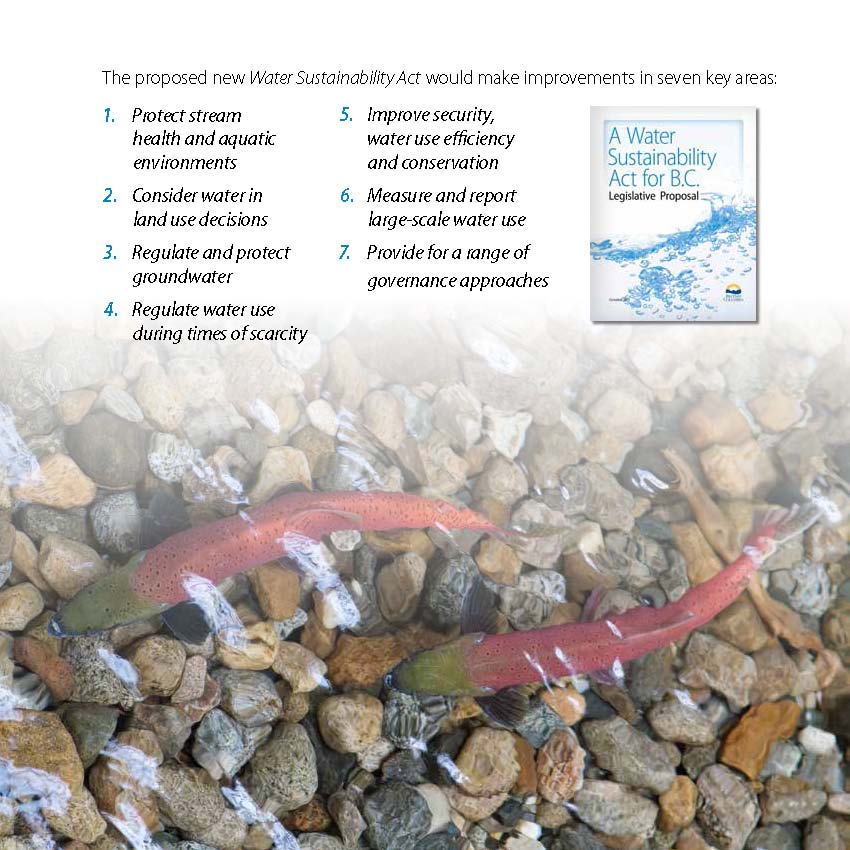“The Water Sustainability Act provides a fresh opportunity and framework to collaborate and implement watershed-based solutions,” says Ted van der Gulik
‘Historic achievement’ as British Columbia replaces its 105-year old Water Act
On April 29, 2014 the British Columbia Legislature passed the Water Sustainability Act (Bill 18). The Act recognizes the connection between land use actions and the implications for the both the water cycle and watershed sustainability. This means the Act will have widespread impacts on how water and land practitioners conduct their work.
Completion of the enactment process involves development of regulations and Royal Assent. The Province’s plan is that the Water Sustainability Act will come into force in 2015. In the meantime, the first phase of work will be undertaken this year and will comprise groundwater regulations as well as a number of other tools.
Act has Broad-Based Support
“A decade in the making, the new Water Sustainability Act truly is an historic achievement. Provincial staff merit accolades for their diligence and commitment in developing an Act that moves the province in the right direction,” states Ted van der Gulik, President of the Partnership for Water Sustainability in BC. Recently retired from government, he observed the roles that government staff had and the approach that was taken .
.
“Developing and crafting the act was a difficult and challenging job, as there are many views on water, many of them conflicting. Provincial staff consulted far and wide to ensure a diversity of input. The end result is legislation that has broad-based support.”
Framework for Water Sustainability Plans
“There are many water management issues that need to be resolved and the new act has established a process that can address many of them. BC is one of the few remaining jurisdictions in North America that have yet to licence groundwater, something that will now be rectified.”
“Also, proclamation in 2015 of the provision that allows for the development of Water Sustainability Plans will enhance food security by securing water for future development of agricultural lands; ensure critical environmental flows for survival of fish and other aquatic habitat; promote a water balance way-of-thinking; and establish a water reporting system so that water is used beneficially.”
“The Partnership for Water Sustainability is already working with the Province on an array of programs that support implementation of the Water Sustainability Act as well as a water balance way-of-thinking in the local government setting. Notable examples of collaboration include the Water Sustainability Action Plan, released in 2004, and the Georgia Basin Inter-Regional Education Initiative, launched in 2012.”
“The Partnership is the lead entity for existing web-based tools that will support implementation of future Water Sustainability Plans in populated areas. These include the Water Balance Model and Water Balance Model Express for Landowners for watershed-based rainwater management; and the Water Conservation Calculator for water supply planning. In addition, the Partnership is assisting the Ministry of Agriculture to expand province-wide application of the Agriculture Water Demand Model because it will be useful in the Water Sustainability planning process.”
Dawn of a New Era
“BC is at the dawn of an exciting new era in water and watershed management. The Water Sustainability Act provides a fresh opportunity and framework for a uniquely British Columbian ‘top-down / bottom-up’ approach. The provincial government, local governments, stewardship sector and others can formally align efforts and collaborate to implement watershed-based solutions,” concludes Ted van der Gulik.
To Learn More:
For a summary of what is in the Water Sustainability Act, download an Overview of the Legislative Proposal. For much more information, check out the Water Sustainability Act website.
The Partnership for Water Sustainability is the hub for a “convening for action” network in the local government setting. The Partnership believes that water and watershed sustainability in the local government setting will be achieved by implementing green infrastructure policies and practices. How BC communities get there relies on a change in mind-set and “land ethic”. The mission of the Partnership is to help facilitate that change.
To learn more, click on ABOUT THE PARTNERSHIP.


